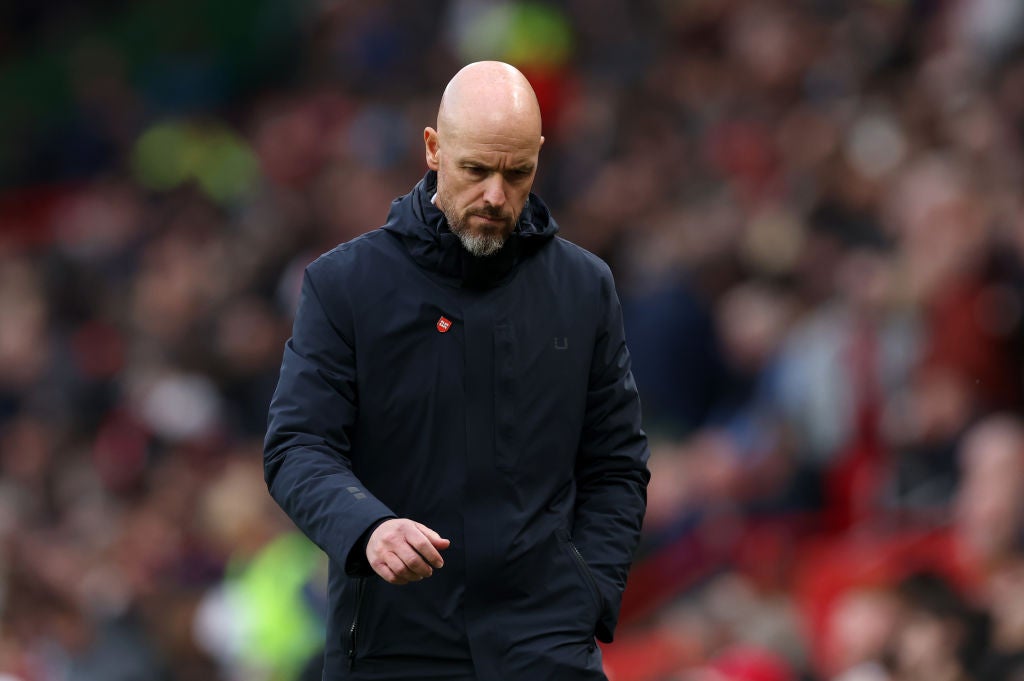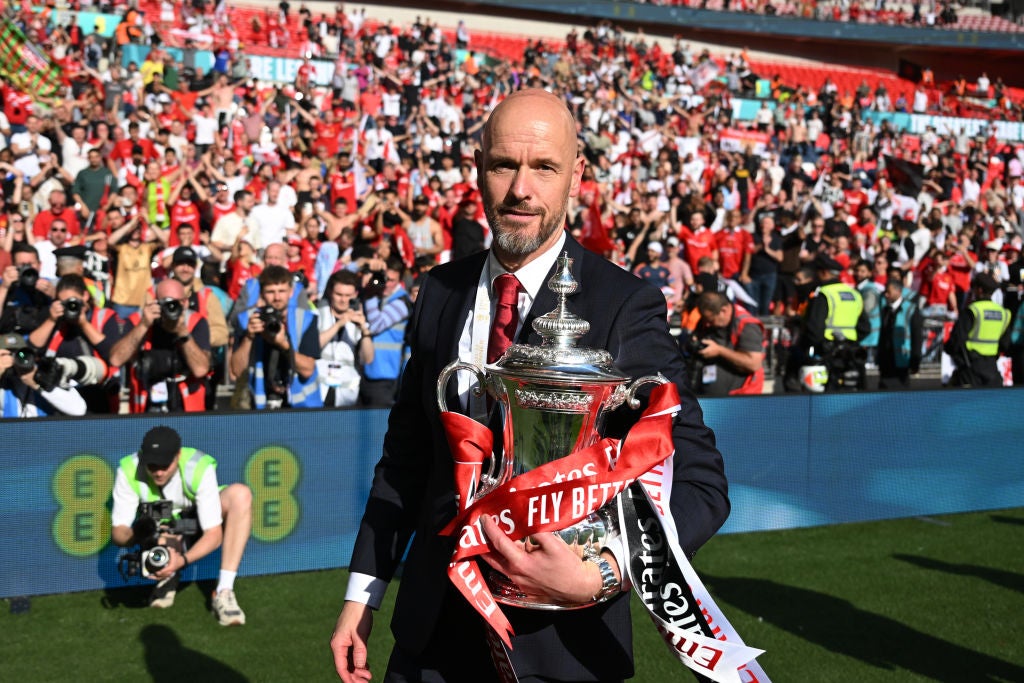Man Utd are always slow to pull the trigger – can Erik ten Hag dodge the bullet again?
A familiar set of events is unfolding at Old Trafford, writes Richard Jolly, but can Ten Hag escape before he is sucked down?


Erik ten Hag may regret his choice of words. In saying on Sunday that he was not worried he would be sacked, the Dutchman stated he was “in the same boat” as Manchester United’s owners. It brought suggestions the vessel in question was the Titanic or some other sinking ship. Any Porto in a storm? It looked that way when United went 2-0 up in Portugal on Thursday, less so when they were 3-2 and a man down. An eventual 3-3 draw nevertheless means Sunday’s trip to Aston Villa assumes colossal proportions. A fourth defeat in six league matches would cast further doubt on Ten Hag’s assertion this week that United would make their season a success.
He had claimed their faltering start to the campaign was nothing to panic about, that he was “not anxious” about his position. He spoke from the position of being Old Trafford’s great survivor. He looked to be headed for the exit in the summer, as United spoke to a series of other managers, after their lowest Premier League finish. But then they won the FA Cup. Ten Hag survived to live another day.
But there are different forms of living. Even if his reign continues for some time, the danger is he enters the Manchester United death spiral. He would not be the first. There have been four predecessors whose demise became a question of when, not if. Ten Hag, however, is arguably the first to have extricated himself from the spiral, in the summer. Or merely he is the latest proof that it can take time to suck managers down it: Jose Mourinho delayed his own departure by winning away at Juventus, six weeks before he was sacked; Ole Gunnar Solskjaer’s third-from-last game was a 3-0 victory at Tottenham. Neither sparked an improvement. Either perhaps should have been dismissed sooner.

It is in part because, while United have been accused of not sticking with a manager since Sir Alex Ferguson, they have felt slow to pull the trigger. Each of the men who preceded Ten Hag seemed to have gone beyond the point of no return.
David Moyes ended up being stalked by someone dressed as the Grim Reaper on his return to Everton in April 2014; it was a stunt by a bookmaker but it meant successive matches had brought elimination from the Champions League and mathematical confirmation United would not get a top-four finish. Yet it had been going wrong for months: there was the back-to-back home defeats in December, the three successive losses that began January.
If firing Moyes with four games to go – surprising the Scot, who tried to ring Ferguson to see what was going on, but the older man did not answer – brought accusations of brutality, Louis van Gaal’s drawn-out departure only seemed to shock the Dutchman himself. His days were numbered after four defeats in a row in December; yet he lingered on until the summer. If former executive vice-chairman Ed Woodward hoped to give the impression of an orderly change, Mourinho was lined up as a replacement, the news broken to Van Gaal by his wife at Wembley after he had won the FA Cup.
It indicated a preference at United to leave change until the close-season; the risk is Ten Hag becomes the third consecutive manager whose nosediving fortunes require a departure before Christmas.
Mourinho was finished off by Liverpool, in a flurry of 36 shots at Anfield in 2018. But United were already 11 points off the top four after an autumn of discontent, interrupted only by the occasional uplifting result, such as victory at Juventus, which bought him more time. A recurring theme during the Glazers’ ownership was that failure to qualify for the Champions League was a sackable offence: with Sir Jim Ratcliffe’s arrival, Ten Hag bucked that in June.

If there are those at Old Trafford who want to give him a chance to turn it around, that was true of Solskjaer, too. Yet they gave him too much: if the hope was that he could turn it around, like Moyes, Van Gaal and Mourinho, he could not. The Norwegian was dismissed after a 4-1 demolition at Watford, a fourth disastrous day in five weeks that still included an international break. With the benefit of hindsight, he should have gone after Leicester, or Liverpool, or Manchester City.
So to Ten Hag, who has arguably overseen more dreadful displays in the last 14 months than Solskjaer did in his whole reign, who was given the “full backing” of new chief executive Omar Berrada five weeks ago. Perhaps it will be justified, the awful performance against Tottenham consigned to the past.
But the last 11 years at Old Trafford affords the possibility history will repeat itself, that there will be another long, painful death. With the spectre of Gareth Southgate, who has his admirers at Ineos, there is the chance a replacement has already been identified, as Mourinho was for Van Gaal.
With Ruud van Nistelrooy on the coaching staff, there is a possible caretaker with a Solskjaer-esque profile, though United’s last experience of an interim appointment – in Ralf Rangnick – may have scarred them as well as him.
Ten Hag, meanwhile, can excel at sounding defiant. He did in spring when he confounded many an expectation by winning the FA Cup and keeping his job. But the task now is not merely to stay at Old Trafford, but to stay out of the managerial death spiral.
Join our commenting forum
Join thought-provoking conversations, follow other Independent readers and see their replies
Comments


Bookmark popover
Removed from bookmarks